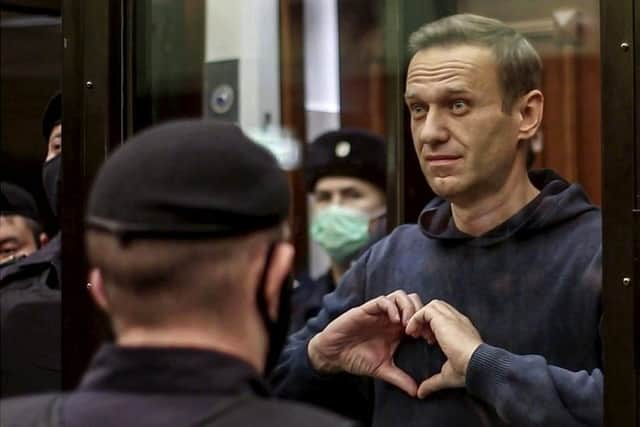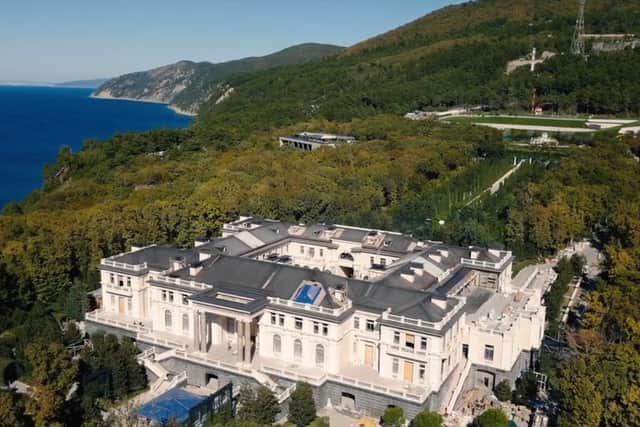Alexei Navalny: who is the man Putin couldn’t kill, what happened to him and why is he in jail in Russia


Russian attacks on foreign soil have made headlines around the world in recent years, including in Britain, where Sergei and Yulia Skripal were almost murdered in Salisbury in 2018.
There have been a number of questionable deaths relating to Russian leader, Putin, as former friends and sworn enemies have died under suspicious circumstances.
Advertisement
Hide AdAdvertisement
Hide AdChannel 4 will now delve deeper into one such case, where the victim did not die and has not remained quiet about his ordeal.
The channel’s documentary, The Man Putin Couldn’t Kill, will look at the case of Alexei Navalny and how he was poisoned by a member of the FSB - Russia’s Federal Security Service.
So, who is Navalny and why did Putin want to kill him? This is what you need to know.
Who is Alexei Navalny?
Navalny grew up in Obninsk about 100 kilometres south-west of Moscow, but spent his childhood summers with his grandmother in Ukraine.
Advertisement
Hide AdAdvertisement
Hide AdIn 1998, he graduated with a law degree from The People’s Friendship University of Russia and in 2000, Navalny joined the Russian United Democratic Party Yabloko. Two years later he was elected as the official for the party in Moscow. He later became Chief of Staff for the party.
In 2007, he left the party and co-founded the National Russian Liberation Movement, known as NAROD (The People), he made clear that he condemned "any ethnic or racial hatred and any xenophobia".
During the 2011 election campaign, the party claimed there had been instances of electoral fraud and thousands gathered in Moscow to protest the results. Over 300 people were arrested, including Navalny.
Alexei Venediktov, editor-in-chief of Echo of Moscow radio station, called the arrest "a political mistake, when Navalny was released he called on Russians to unite against Putin, who Navalny said would try to claim victory in the presidential election.
Advertisement
Hide AdAdvertisement
Hide AdHe also said that there was no point in him running against Putin as the elections would be rigged, but did lead a demonstration against Putin which attracted over 50,000 people.
He then began offering his blog in English, at which time BBC News described Navalny as "arguably the only major opposition figure to emerge in Russia in the past five years".
Since then, as well as running for elected positions, he has become an internet sensation with millions of followers across Russia and the world.
He uses the platform to campaign against corruption and is now considered as the leader of Putin’s opposition.
Advertisement
Hide AdAdvertisement
Hide AdHe is married and has two children, his Wife Yulia lives in Moscow with his son Zakhar, his daughter Daria is studying in the US.
What happened to him?
In August 2020, Navalny collapsed on a flight to Moscow while flying over Serbia, the flight detoured and landed in the city of Omsk.
A German-based charity then convinced officials to allow him to be flown to Germany for treatment, and while his doctors first insisted he was too sick to travel, they were eventually persuaded to let him go.
In September, the German government revealed the poison used was “a chemical nerve warfare agent of the Novichok group". The Kremlin denied any involvement and rejected the Novichok finding.


Advertisement
Hide AdAdvertisement
Hide AdNavalny then accused Putin of poisoning him and later posed an an FSB security agent to dupe his would be assassin into admitting he the smeared a chemical weapon onto Navalny’s underwear in a bid to poison him.
The same poison was also found on a water bottle in his hotel room, suggesting the agent had been placed there before he got on the flight.
He has since reiterated that it was President Putin who instructed his murder, and repeated these allegations in court.
"His main gripe with me is that he’ll go down in history as a poisoner," Navalny told the court scornfully. "We had Alexander the Liberator, Yaroslav the Wise, and we will have Vladimir the Underpants Poisoner."
Advertisement
Hide AdAdvertisement
Hide AdDetective work by the investigative group Bellingcat pointed to long-running Federal Security Service (FSB) shadowing of Navalny - despite the official denials.
The EU has since imposed sanctions on six top Russian officials and a Russian chemical weapons research centre. Russia and Putin have denied any involvement.
Why is he in jail?
Against advice, Navalny returned to Russia when he had recovered from the poisoning and was arrested as he entered the airport on 17 January.


He has been jailed for charges from 2014 relating to theft, the Russian government claimed he violated terms of parole. He received three and a half years for alleged involvement in embezzlement, but the initial jail term was suspended.
Advertisement
Hide AdAdvertisement
Hide AdNavalny denies all wrongdoing but insists he checked in with police twice a month, prior to the poisoning. In 2016, the European Court of Human Right claimed his rights had been violated and he should be released of all sanctions but a Russian court upheld the charges.
Following his arrest in January this year, his supporters staged mass protests across Russia and police detained thousands of his supporters who attended the unauthorised rallies.
He has maintained a significant social media presence from inside the jail, including the production of a video titled ‘Putin’s Palace’ in which he claimed a luxury mansion on Russia’s southern Black Sea coast purportedly belonging to Putin.
The video has been viewed more than 117 million times and claims the estate is 39 times the size of Monaco and was paid for with "the largest bribe in history."


Advertisement
Hide AdAdvertisement
Hide AdHe has also accused the president of "sucking the blood out of Russia" through a "feudal state" concentrating power in the Kremlin.
Navalny has become increasingly popular with young people in Russia, though he is not the heroic face of change as many older Russians find his style to abrasive and hardcore.
The European Courts have again insisted he be released due to a risk of death, with Putin refusing to confirm whether he will be released alive.
“He will not be treated any worse than anyone else,” the Russian President told the US network, NBC.
Navalny now hopes his followers could use a tactical voting system to derail Putin at the next Russian legislative elections, held from 17 to 19 September.
Comment Guidelines
National World encourages reader discussion on our stories. User feedback, insights and back-and-forth exchanges add a rich layer of context to reporting. Please review our Community Guidelines before commenting.
